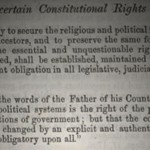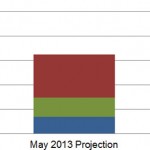A Testing Notification Bill Passes a Semi-Present Senate Committee
Yesterday evening, the Senate Education committee passed a high-school testing bill which, as a result of the amendment process, is substantially different from the bill originally introduced.
The original bill placed a permanent prohibition on the use of standardized testing as a graduation requirement. The amended bill assumes that a “state assessment requirement for graduation from high school” will be in place, and defines procedures for notifying parents and students that assessment requirements are in danger of not being met, and for informing the governor and the executive branch of various test-related results.
The bill passed by a 6-0 vote of the Education Committee with 6 members absent, but only reached 6 votes with the help of the Senate President and Majority Leader adding their two ex-officio “yes” votes to four “yes” votes from regular committee members — to state the obvious here, this means that only four of ten regular committee members showed up to vote on a potentially important bill.
I will point out here that you cannot come to the conclusion that a quorum was present at the committee hearing with a simple answer of “ex-officio members do count towards a quorum” [only 6 of 12 members present] or “ex-officio members don’t count towards a quorum” [only 4 of 10 members present]; you only get to a quorum for last night’s vote by saying that ex-officio members do count when determining how many members are present, but don’t count when determining how many people need to be present.
For reference, here what Roberts’ Rules has to say about ex-officio committee members and quorums…
If the ex-officio member is under the control of the society, there is no distinction between him and the other members except where the president is ex-officio member of all committees, in which case it is evidently the intention to permit, not to require, him to act as a member of the various committees, and therefore in counting a quorum he should not be counted as a member.
Like most parliamentary procedure rules, this one is grounded in solid principle; the principle to consider here is whether committees should be passing bills, dependent on ex-officio votes, when a majority of regular members can’t be bothered to show up or may have decided to avoid a difficult issue.



